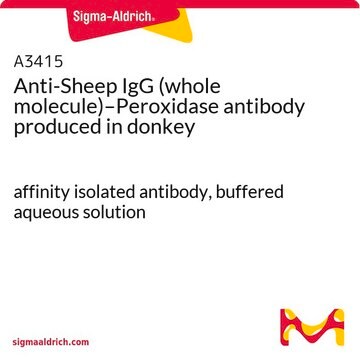S1265
Anti-Sheep IgG (whole molecule) antibody produced in rabbit
IgG fraction of antiserum, buffered aqueous solution
About This Item
Productos recomendados
biological source
rabbit
Quality Level
conjugate
unconjugated
antibody form
IgG fraction of antiserum
antibody product type
secondary antibodies
clone
polyclonal
form
buffered aqueous solution
technique(s)
indirect ELISA: 1:50,000-1:100,000
shipped in
dry ice
storage temp.
−20°C
target post-translational modification
unmodified
¿Está buscando productos similares? Visita Guía de comparación de productos
General description
Specificity
Immunogen
Application
- Enzyme-linked immunosorbent assay (ELISA)
- Immunoprecipitation
- labelling electrodes in immunosensor systems
Biochem/physiol Actions
Physical form
Disclaimer
¿No encuentra el producto adecuado?
Pruebe nuestro Herramienta de selección de productos.
Storage Class
10 - Combustible liquids
wgk_germany
WGK 3
flash_point_f
Not applicable
flash_point_c
Not applicable
ppe
Eyeshields, Gloves, multi-purpose combination respirator cartridge (US)
Certificados de análisis (COA)
Busque Certificados de análisis (COA) introduciendo el número de lote del producto. Los números de lote se encuentran en la etiqueta del producto después de las palabras «Lot» o «Batch»
¿Ya tiene este producto?
Encuentre la documentación para los productos que ha comprado recientemente en la Biblioteca de documentos.
Los clientes también vieron
Nuestro equipo de científicos tiene experiencia en todas las áreas de investigación: Ciencias de la vida, Ciencia de los materiales, Síntesis química, Cromatografía, Analítica y muchas otras.
Póngase en contacto con el Servicio técnico









